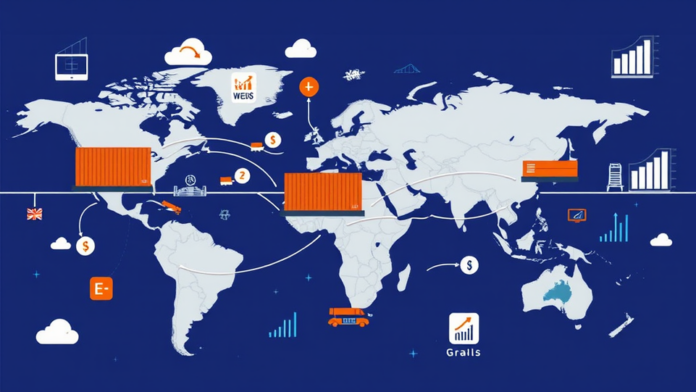Introduction to Global Supply Chain Disruptions
Definition and Overview
Global supply chain disruptions refer to significant interruptions in the flow of goods and services across international borders. These disruptions can arise from various factors, including natural disasters, geopolitical tensions, and pandemics. Such events can lead to delays, increased costs, and inventory shortages. Businesses must adapt to these challenges to maintain operational efficiency. Understanding rhese dynamics is crucial for strategic planning. It’s essential to stay informed.
Historical Context and Recent Trends
Historically, global supply chains have evolved significantly, particularly in the last few decades. The rise of globalization has facilitated complex interdependencies among nations. Recent trends indicate an increasing vulnerability to disruptions. Key factors include:
These elements can severely impact logistics and production timelines. Businesses must recognize these patterns. Awareness is crucial for strategic resilience.
Causes of Supply Chain Disruptions
Natural Disasters and Climate Change
Natural disasters and climate change significantly disrupt supply chains. Events such as hurricanes, floods, and wildfires can halt production and transportation. These interruptions lead to increased costs and delayed deliveries. Businesses must assess their vulnerability to such risks. Proactive measures are essential for mitigation. Understanding these threats is vital for strategic planning. Awareness can drive better decision-making.
Geopolitical Tensions and Trade Policies
Geopolitical tensions and trade policies can severely impact supply chains. Tariffs and sanctions disrupt the flow of goods. These barriers lead to increased costs and uncertainty. Businesses must navigate these complexities carefully. Strategic adjustments are necessary for resilience. Understanding the political landscape is crucial. Awareness can enhance operational efficiency.
Impact on Businesses
Operational Challenges and Delays
Operational challenges and delays can significantly affect businesses. Disruptions in supply chains lead to inventory shortages and production halts. These issues result in lost revenue and decreased customer satisfaction. Companies must implement effective contingency plans. Proactive strategies can mitigate these risks. Understanding operational dynamics is essential for success. Awareness fosters better decision-making and resilience.
Financial Implications and Cost Increases
Financial implications and cost increases can severely impact businesses. Rising operational costs often stem from supply chain disruptions. These expenses can erode profit margins and affect cash flow. Companies must reassess their budgeting strategies. Effective financial management is crucial for sustainability. Awareness of these factors is essential for informed decision-making. Understanding costs can drive better financial outcomes.
Sector-Specific Effects
Manufacturing and Production
Manufacturing and production sectors face unique challenges due to supply chain disruptions. Delays in raw material delivery can halt production lines. This results inwards increased lead times and reduced output. Companies must adapt their processes to maintain efficiency. Strategic sourcing and inventory management are essential. Awareness of these dynamics is crucial for competitiveness. Understanding these effects can enhance operational resilience.
Retail and Consumer Goods
Retail and consumer goods sectors experience significant impacts from supply chain disruptions. Inventory shortages can lead to lost sales and dissatisfied customers. These challenges necessitate agile supply chain strategies. Companies must enhance their forecasting and demand planning. Effective communication with suppliers is vital for success. Awareness of market trends can drive better decisions. Understanding these effects is essential for profitability.
Strategies for Mitigating Risks
Diversification of Suppliers
Diversification of suppliers is a critical strategy for mitigatlng risks. By sourcing from multiple suppliers, businesses can reduce dependency on a single source. This approach enhances supply chain resilience and flexibility. Companies should evaluate suppliers based on reliability and performance. Regular assessments can identify potential vulnerabilities. Awareness of market conditions is essential for informed decisions. Understanding these strategies can lead to greater stability.
Investment in Technology and Automation
Investment in technology and automation is essential for mitigating risks in supply chains. Advanced systems can enhance efficiency and slim down human error . Automation streamlines processes, leading to cost savings and faster production. Companies should prioritize integrating innovative solutions. Regular updates ensure systems remain competitive. Awareness of technological advancements is crucial. Understanding these investments can drive growth.
Financial Planning and Budgeting Considerations
Adjusting Budgets for Supply Chain Resilience
Adjusting budgets for supply chain resilience is crucial for financial stability. Companies must allocate resources to address potential disruptions. This includes investing in inventory management and technology. Regular budget reviews can identify areas for improvement. Flexibility in financial planning enhances responsiveness to changes. Awareness of market dynamics is essential. Understanding these adjustments can safeguard profitability.
Forecasting and Scenario Planning
Forecasting and scenario planning are essential for effective financial management. These processes enable businesses to anticipate market fluctuations and prepare accordingly. By analyzing various scenarios, companies can develop strategic responses. This proactive approach minimizes risks associated with uncertainty. Regular updates to forecasts enhance accuracy and relevance. Awareness of potential outcomes is crucial for decision-making. Understanding these practices can improve financial resilience.
Future Outlook and Trends
Emerging Technologies in Supply Chain Management
Emerging technologies are transforming supply chain management significantly. Innovations such as artificial intelligence and blockchain enhance transparency and efficiency. These technologies enable real-time data analysis and improved decision-making. Companies must adopt these advancements to remain competitive. Rwgular assessments of technological trends are essential. Awareness of these developments can drive strategic growth. Understanding their impact is crucial for future success.
Long-term Changes in Global Trade Dynamics
Long-term changes in global trade dynamics are reshaping market landscapes. Factors such as shifting consumer preferences and geopolitical tensions influence trade patterns. Companies must adapt to these evolving conditions. Strategic realignment of supply chains is essential for competitiveness. Awareness of emerging markets can drive growth opportunities. Understanding these changes is vital for informed decision-making. Adaptability is key to future success.

